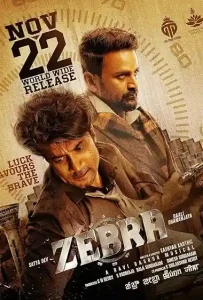Zebra (2024): The One Film Nobody Saw Coming, But Everyone’s Talking About Now
There’s a strange kind of magic when a film doesn’t arrive with the roar of marketing blitzes, but instead grows into something much bigger, like a whisper that turns into a storm. Zebra (2024) is one of those rare pieces of cinema. No grand trailer drops. No big posters plastered across multiplexes. And yet, it’s rapidly becoming a cult obsession across Reddit threads, Malayalam film forums, and unexpectedly, small WhatsApp film clubs from Pune to Pondicherry.
Directed by Prem Shankar, a name you might recall from Randuper, the film is everything and nothing you expect. It’s neither mainstream nor strictly indie. It’s slow and yet charged with unease. Zebra moves like a poem, but cuts like a blade. The story, without giving spoilers, circles around a retired cop, grief, and the wild unpredictability of the human mind.
For most viewers, the hook was Arjun Radhakrishnan, who you probably remember as APJ Abdul Kalam in Rocket Boys. In Zebra, he is stripped of all the glory and turned into something disturbingly normal. And that’s precisely why his character haunts you long after the credits roll.
But here’s the real twist: the film hit OTT quietly in late 2024 and began gaining traction in early 2025, not through advertising, but purely by word of mouth. Think Kumbalangi Nights but darker, lonelier, and with almost no music to comfort you.
Read also: Ambat Shoukin (2025)
What makes Zebra so emotionally uncomfortable and yet oddly addictive?
There’s something raw and unfiltered about Zebra. It doesn’t give you those emotional payoffs we’re trained to expect. There are no ‘mass’ moments, no savior arcs. Instead, you’re handed scenes that feel like surveillance footage of someone’s crumbling soul.
Take, for instance, the scene where the protagonist sits in his empty kitchen for what feels like a full minute, not speaking, not moving, just existing. In most films, that would be trimmed out as “unnecessary”. But in Zebra, that stillness is the story. And if you’ve ever battled anxiety, isolation, or even just had a bad week, you’ll feel something crack open inside you while watching it.
The film’s monochrome aesthetic (yes, it’s actually in black and white) isn’t just a gimmick either. It forces you to look harder, focus deeper, and sit longer. It dares you to stay. Not everyone does. Twitter is full of users admitting they paused midway because the emotional weight was “too much for a Tuesday night.”
But those who finish it? They emerge changed.
“I couldn’t stop thinking about my father,” one Redditor wrote.
“It reminded me of that one uncle who disappeared after retirement. No one checked on him. Now I can’t stop wondering why,” someone posted on Quora.
“This isn’t a movie, it’s a mirror. A brutal, silent mirror,” shared a YouTube comment that now has over 3,000 likes.
For Indian audiences who are slowly warming to introspective cinema thanks to streaming platforms, Zebra taps into a quiet but growing hunger for real, complex, human stories.
Also read: Edagaiye Apaghatakke Karana (2025)
The Zebra controversy no one saw coming: Was it ‘too raw’ for Indian OTT?
Here’s where things get spicy. When Zebra was pitched, multiple OTT platforms reportedly passed on it, labeling it “too niche” or “not commercially viable”. According to indie gossip blogs and insider leaks, the film almost didn’t release at all.
In a country where even “art house” films often try to include a touch of glamour or score, Zebra went the other way. No background music. No romantic angle. No resolution.
This refusal to conform made some people angry. A small section of critics dismissed it as “pretentious”. A few film-school influencers called it “emotionally manipulative”. And one popular YouTuber even questioned if “mental health was being used as a plot tool”, a comment that sparked an intense backlash, especially from mental health advocates.
Yet despite this, or maybe because of it, the film has found its tribe. Mental health counselors have started referencing it in sessions. One Mumbai-based therapist told an online film magazine:
“Zebra isn’t just a film. It’s a therapeutic confrontation. It shows the damage silence does, how we neglect people, and how grief metastasizes.”
And here’s a detail that hits hard. The film’s name, Zebra, is a metaphor not just for black-and-white morality, but also for zebra code in emergency medicine. It’s a term doctors use for rare, often overlooked diagnoses.
Just like the film itself.
Read more: See Saw (2025)
Why Zebra (2024) might define a new genre of Indian filmmaking in 2025
We often talk about “pan-Indian” cinema as loud, star-studded spectacles. But what if the next evolution of pan-Indian isn’t bigger but quieter?
Zebra isn’t dubbed into multiple languages. It doesn’t have English subtitles on by default. It doesn’t even appear on your OTT homepage unless you search for it. And yet, the film has quietly entered conversations from Delhi college canteens to Bengaluru co-working lounges.
Some are even calling it the beginning of a new Malayalam noir wave, slow, bleak, introspective, with a strong philosophical core. Other films like Purusha Pretham and B 32 Muthal 44 Vare hinted at this, but Zebra has taken it all the way.
There’s a certain poetic justice in the fact that a film that almost didn’t release is now teaching mainstream producers a lesson in emotional risk.
And for Indian mobile readers, always caught between reels and reality, Zebra might just be the break their soul needed.
Read more: Eddington (2025)
Bottom line?
If you’re looking for something that’ll entertain you, scroll on.
But if you’re ready to feel something deeply uncomfortable, and maybe even grow from it, search for Zebra.
Just make sure you’re in a quiet room.
And maybe keep your phone face down.

